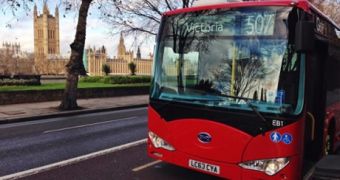London's public transportation fleet is now greener than it was just a day ago. This is because, this December 19, two electric buses hit city streets and began servicing Victoria, Waterloo and London Bridge stations on routes 507 and 521.
Information shared with the public says that the buses were manufactured by BYD Auto, a Chinese company based in Shenzhen, Guangdong Province.
They can cover about 250 kilometers (155 miles) on a single charge and, once they run out of power, it only takes about four – five hours to feed them enough juice to get them up and running at full capacity once again.
Business Green reports that, according to BYD Auto, the running costs associated with these electric buses are significantly smaller than the ones associated with similar vehicles that run on diesel.
More precisely, each is estimated to have running costs roughly 75% lower than that of a diesel bus.
Due to the fact that they rely on electricity in order to move about, the buses release no greenhouse gas emissions. Hence, they can be argued to yield not only financial, but also environmental benefits.
“Electric buses could help deliver the cleaner and greener bus fleet we need to cut carbon emissions and improve air quality,” Matthew Pencharz, environment and energy advisor to the mayor of London, commented on the move to add these two electric buses to the city's public transportation fleet.
According to the same source, high officials in London plan to purchase several more electric buses in the not so distant future.
Thus, should these two vehicles prove that eco-friendly buses can meet transportation needs on short routes around the city, six more of their kind will hit streets in early 2014.
Interestingly enough, several other green buses are already in use in London. More precisely, 600 hybrid buses are operational in this urban area, and the city is also trialing 120 buses that are powered by used cooking oil.
“If these prove successful we plan to see more introduced over the next few years to run alongside the hybrid and hydrogen bus technology that is already tackling air pollution and carbon emissions across the Capital,” Matthew Pencharz said in a statement.

 14 DAY TRIAL //
14 DAY TRIAL //